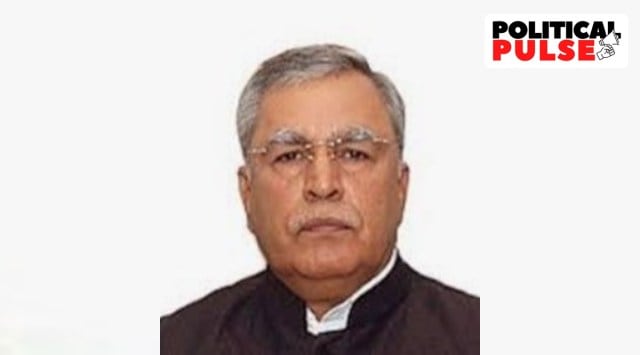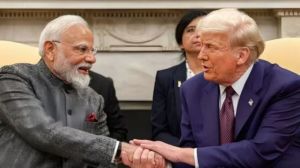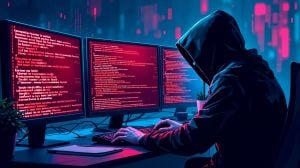Newsmaker: Face of J&K’s anti-terror ops set to take up BJP role amid poll buzz
Farooq Khan's resignation as Advisor to J&K’s Lt Governor Manoj Sinha is being seen as a prelude to him taking up an important political role in the party in Jammu and Kashmir.
 Farooq Khan
Farooq KhanFarooq Khan, 67, who resigned as Advisor to J&K’s Lt Governor Manoj Sinha on Sunday evening, is a decorated former IPS officer widely appreciated for his role in spearheading the war against terror during peak militancy in the 1990s.
The resignation is being seen as a prelude to Khan taking up an important political role in the party in Jammu and Kashmir, where Assembly elections, as per repeated statements of Prime Minister Narendra Modi and Home Minister Amit Shah, will be held soon after the delimitation of constituencies. Having supporters among all the communities, especially Hindus and Muslims, he is likely to be the BJP face in the Union Territory.
Khan’s resignation comes amidst several developments being seen as a prelude to the elections. Last week, Shah was in Jammu for several high-level meetings to review the security scenario. BJP leaders admit word has come to them to start preparations for elections, without waiting for a formal announcement.
A Dogri-speaking Punjabi Muslim from Jammu division, Khan was born to a prominent family. His grandfather Colonel Peer Mohammad served in the army of Dogra ruler Maharaja Hari Singh and was said to have played a key role in fighting off Pakistan’s invasion bid in 1947-48. Col Peer Mohammad was also the first president of the Bharatiya Jana Sangh (the precursor of BJP) in J&K. Farooq Khan’s father Sardar Mohammad Sarwar Khan retired as Superintendent of Police.
From the start of his career as a Kashmir Police Service officer in the mid-1980s, Farooq Khan stood out. A junior SP in mid 1993, he was among the handful of officers who took on militants during peak terror in Kashmir when State institutions were virtually defunct, with even personnel in the Srinagar Police Control Room going on strike.
When need was felt for an elite unit with commando-like officers for counter-terrorism operations, he helped set up and lead the J&K Police Special Task Force (STF) in 1995, with the full backing of then DGP M N Sabharwal. It was later renamed as the Special Operations Group (SOG). The idea was to involve the local police in anti-terror activities.
As head of the STF, Khan’s team was behind the killing of three Al-Fatah militants in October 1994, in a joint operation with the 26 Punjab Regiment, and for ending the 1996 occupation of the Hazratbal shrine without any harm coming to the shrine. In the three-day standoff, nine militants and two policemen were killed while 20 terrorists surrendered.
The force was credited with almost wiping out terror groups like the Tehreek-ul-Mujahideen, besides huge arms and explosive hauls, including the first-ever seizure of anti-aircraft weapons in Kupwara, making Khan the most dreaded name among terror groups in J&K.
The recruitment of surrendered militants for anti-terror operations was also Khan’s idea. Among those recruited at the time was the counter-insurgent group Ikhwan-ul-Musalmoon, led by Kuka Parray. Together, the STF and counter-insurgents are said to have killed more than 2,000 militants, ensuring that Lok Sabha elections were held in 1996 in J&K, after a gap of seven years.
In Jammu, Khan spearheaded operations against the militants who attacked Ragunath temple and Panjbakhtar temple in late 2002. He served in almost all the districts of the erstwhile state, both in counter-insurgency and police operations, and was awarded the President’s Police Medal for Gallantry twice.
However, Khan faced controversies over many of his initiatives, including Ikhwan’s extra-juidicial activities. He was suspended for two years in 2003 for his alleged role in the Pathribal fake encounter of March 25, 2000, in which the Army claimed to have killed five militants responsible for the massacre of 36 Sikhs in Chattisinghpora village of Anantnag district. In a related incident, eight demonstrators had been killed by SOG personnel in Brakpora, Anantnag.
The five alleged militants were later found to be local villagers. A one-man judicial commission had cleared Khan of the charges of being involved in the killings and fudging of DNA samples of those killed. A CBI probe had later held seven Rashtriya Rifles soldiers responsible for the fake encounter.
Once absolved of the charges by both the Pandian commission and CBI, Khan was reinstated. He had also approached the Central Administrative Tribunal and J&K High Court, with the then Ministry of Home Affairs clearing his name.
Khan retired in 2013 as Inspector General of Police. Before the 2014 general election, he joined the BJP, a party he had been associated with while at college, during a rally in the presence of Narendra Modi, and was appointed national secretary of the party the next year. He also served as BJP spokesperson, and in-charge of the BJP minority morcha at the national level and its affairs in Nagaland.
Later, Khan served as Administrator to the Union Territory of Lakshadweep in September 2016-19. He was in-charge of the relief work there after cyclones hit the islands in 2017.
On July 13, 2019, he was appointed Advisor to then J&K Governor Satya Pal Malik. He remained in the post as J&K became a UT and the Governor’s role passed on first to Lt Governor G C Murmu and then Manoj Sinha.
Khan has earlier said that political parties especially the Congress at the national level and the National Conference and PDP in J&K have misled Muslims for their own vested interests, and that things had started changing now. After the recent Assembly elections in UP, he said: “Muslims saw the reality and voted for inclusiveness, prosperity, employment, development and peaceful environment.”
On charges of aggressive Hindutva against the BJP, Khan says: “Are there not organisations that stand for Islam, Christianity? Just because Hindus are a majority, you cannot say standing for them is a crime.”





- 01
- 02
- 03
- 04
- 05


























